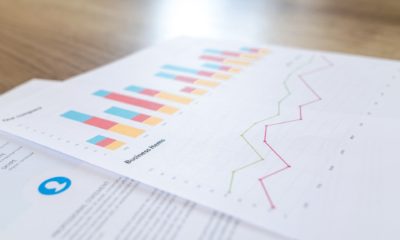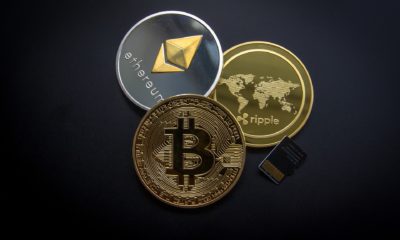Business
Aldi on course for success in the U.S.
Aldi is one of the most popular retailers in Germany. The discounter is also very successful abroad. In all likelihood, the food giant’s strategy also shows great results in the U.S. Analytics and market researchers predict that Aldi could produce more revenue in the U.S. in 2021 than Aldi Nord and Aldi Süd in Germany. This year’s revenue is expected to reach $33.4 billion (€ 31.1 billion).

Aldi has played a leading role in the German retail sector since its launch. The strategy of the food giant also seems to work in another country. In the U.S., Aldi will soon be more successful than in its home country Germany.
According to a forecast by market researcher Edge by Ascential Aldi in the U.S. could generate more sales next year than Aldi Nord and Aldi Süd in Germany combined. This year, sales are estimated to amount to $33.4 billion (€31.1 billion), in America to $32.5 billion (€30.1 billion).
But this should change as early as next year. According to the calculations of Boris Planer, an economist at Edge by Ascential, revenues in 2021 are expected to climb to $34 billion (€31.5 billion) in Germany and even to $35 billion (€32.4 billion) in the U.S.
Get the latest Born2Invest news: in-depth news, comment, and analysis of the corporate world including business headlines from around the globe.
Aldi could be more successful abroad than in Germany
Aldi is constantly testing new strategies to attract more customers not only in Germany. The discounter is also constantly expanding in the U.S. and the German concept seems to be more than well-received in America.
With the U.S. market expected to outperform the German market as early as next year, the brand will continue to grow in the U.S. Sales of 34.5 billion euros are expected as early as 2022, rising to a gross sales volume of $37.2 billion (€38.4 billion) by 2024. At the same time, sales in Germany are expected to increase less and then already be $5.4 billion (€5 billion) behind the U.S. business.
What makes Aldi so successful
Aldi’s success did not come overnight. Since the brothers Karl and Theodor took over the business in 1945, they have constantly developed new concepts to win new customers. Starting with the big step that customers serve themselves in the shop. Before that, sales assistants were responsible for the service.
But it is not only new concepts, more modern stores or contemporary innovations such as WLAN in the store that secure Aldi the discounter pole position. As the market leader, Aldi also sets the prices: If the discounter goes down on prices, the competition has to follow suit. As a result, a large selection of products can be offered at the lowest price. In the meantime Lidl, Penny, and Co. are also following suit, lowering prices and making low-price offers, which increases the pressure on Aldi – which in turn benefits the customer.
Product range and price reductions
When Aldi Süd and Aldi Nord added Persil detergent to their product range for the first time a few days ago, Lidl, Kaufland, and Co. responded with large price reductions. Many wondered why the discount store suddenly offered three brands of detergent. Specifically, customers found Ariel, Persil, and private label Tandil.
The breakup followed just a few days later when Persil promptly replaced Ariel on the detergent shelf. Presumably, the discounter had expected a bigger increase in sales, as the “Lebensmittel Zeitung” also speculated. The brand exchange is part of a new strategy that Aldi is now implementing.
Due to the constant price war, consumers can always get hold of bargains – and this increases the popularity and success of the discounter.
__
(Featured image by Markus Spiske via Unsplash)
DISCLAIMER: This article was written by a third party contributor and does not reflect the opinion of Born2Invest, its management, staff or its associates. Please review our disclaimer for more information.
This article may include forward-looking statements. These forward-looking statements generally are identified by the words “believe,” “project,” “estimate,” “become,” “plan,” “will,” and similar expressions. These forward-looking statements involve known and unknown risks as well as uncertainties, including those discussed in the following cautionary statements and elsewhere in this article and on this site. Although the Company may believe that its expectations are based on reasonable assumptions, the actual results that the Company may achieve may differ materially from any forward-looking statements, which reflect the opinions of the management of the Company only as of the date hereof. Additionally, please make sure to read these important disclosures.
First published in CHIP, a third-party contributor translated and adapted the article from the original. In case of discrepancy, the original will prevail.
Although we made reasonable efforts to provide accurate translations, some parts may be incorrect. Born2Invest assumes no responsibility for errors, omissions or ambiguities in the translations provided on this website. Any person or entity relying on translated content does so at their own risk. Born2Invest is not responsible for losses caused by such reliance on the accuracy or reliability of translated information. If you wish to report an error or inaccuracy in the translation, we encourage you to contact us.

-

 Crypto6 days ago
Crypto6 days agoCrypto Markets Under Pressure as Vitalik Buterin Sells 17,000 ETH
-

 Markets2 weeks ago
Markets2 weeks agoWeather-Driven Supply Outlook Lifts Coffee Markets in Brazil and Vietnam
-

 Impact Investing1 day ago
Impact Investing1 day agoGreen vs. Brown Stocks: Climate Policy, Capital Costs, and the Battle for Market Returns
-

 Business2 weeks ago
Business2 weeks agoTopRanked.io Weekly Affiliate Digest: What’s Hot in Affiliate Marketing [Best Technology Affiliate Programs]
























